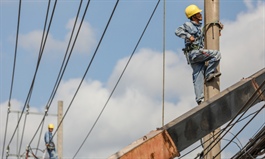Vietnam increases efforts to raise sovereign credit rating
Vietnam increases efforts to raise sovereign credit rating
Vietnam has become a middle-income country and will depend more on commercial loans, meaning that it must raise its sovereign credit rating to attract additional foreign investment.

Vietnam has signed agreements with major credit rating agencies |
Improved rating
To create favorable conditions for the government as well as the private sector to access international capital markets, Vietnam has signed agreements with the big three credit rating agencies, Moody’s, S&P and Fitch.
In addition to strengthening cooperation with credit rating agencies, Vietnam has implemented numerous measures to reduce budget overspending. In addition, debt restructuring and management have contributed to enhancing fiscal policy, helping the country cope with risks, such as natural disasters, storms, floods and epidemics. In the 2016-2020 period, the ratio of public debt to gross domestic product (GDP) decreased from 63.7 percent in 2016 to 55.8 percent in 2020.
Vietnam was the only country in the world to have its outlook improved this year by Moody’s, S&P and Fitch, from “stable” to “positive”, according to the Ministry of Finance.
Truong Hung Long, director of the Department of Debt Management and External Finance under the Ministry of Finance, said Vietnam had become a middle-income country and will depend more on commercial loans. Therefore, raising sovereign credit rating is needed to enhance its prestige and gain trust of international investors.

Raising sovereign credit rating will depend on the financial health of the banking sector |
Institutional reforms needed
Raising sovereign credit rating will lower the cost of raising foreign capital for the government and businesses, especially in the context of declining official development assistance (ODA). To raise sovereign credit rating, Vietnam needs to make further efforts and devise specific plans and orientations.
According to the State Bank of Vietnam, raising sovereign credit rating will depend on the financial health of the banking sector, reduction of potential debt risks, expansion of state budget revenues and improvement of fiscal transparency and data disclosure.
Financial-banking expert Nguyen Tri Hieu said Vietnam is still considered a non-market economy. Therefore, making strong institutional reforms is vital for Vietnam to shift to a market economy. To achieve the goal, it is necessary to speed up the restructuring of the economy, accelerate equitization of state-owned enterprises and create favorable conditions for domestic and foreign private businesses to participate in key sectors of the economy.
Credit rating agencies regard the business environment as an important benchmark for raising sovereign credit ratings, requiring Vietnam to continue improving its environment and promoting administrative reforms in a more drastic and substantive manner.
| In the current context, improving the resilience of the Vietnamese economy to withstand and recover from external shocks is posing many difficulties and challenges due to the complicated developments of the Covid-19 pandemic. Therefore, Vietnam needs to quickly control the pandemic and to be ready for the new normal. |


























